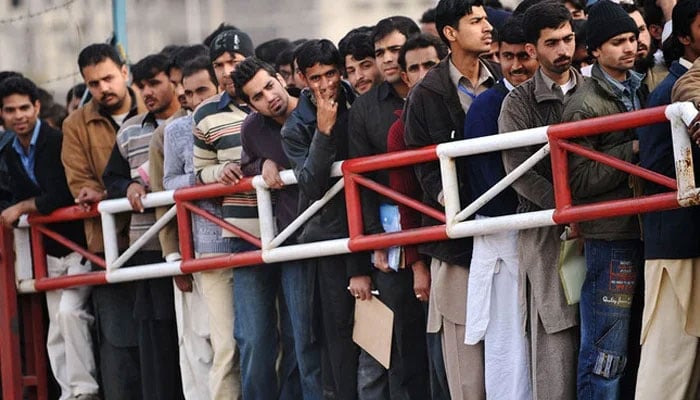Addressing youth unemployment
LAHORE: The International Labour Organization’s Global Employment Trends for Youth 2024 report indicates that youth unemployment in Pakistan remains a pressing issue. Although the youth unemployment rate has slightly decreased to approximately 9.7 per cent, it is still considerable.
The report underscores that a significant portion of the youth is engaged in informal employment, which lacks social protection and stable income. The report also highlights that young women experience higher unemployment rates compared to their male counterparts, exacerbating gender disparities in the labour market.
Addressing youth unemployment in Pakistan, especially given the country’s challenging economic situation, requires a multifaceted strategy that tackles both immediate and long-term issues. Initially, the government should align technical and vocational education with market demands. Collaborations with private companies can ensure that training programmes are relevant and up to date.
With the global shift towards digital economies, providing training in digital skills such as programming, digital marketing, and e-commerce could open new employment opportunities. However, this progress is hampered by low education levels among young people.
Fostering a startup culture is also crucial. Providing access to finance, mentorship, and business development services can help young entrepreneurs transform ideas into viable businesses. Expanding microfinance and offering low-interest small business loans -- currently high -- can empower youth to start their ventures, particularly in underserved areas.
The government should partner with the private sector to create apprenticeship and internship programs that offer practical experience and a pathway to permanent employment. Encouraging companies to engage in corporate social responsibility (CSR) activities focused on youth employment, such as sponsoring skill development programs or funding job creation projects, is also essential.
Agriculture plays a vital role in Pakistan’s economy. Modernizing this sector with advanced technology, sustainable practices, and training could increase youth employment and productivity. The state should promote opportunities in agribusiness, including organic farming, food processing, and agricultural exports.
Introducing tax breaks or subsidies for companies that hire young workers, especially in high-growth sectors, could stimulate job creation. Large-scale infrastructure projects focused on employing youth can provide immediate jobs and long-term economic benefits.
Incentives should be provided to encourage the informal sector to transition to the formal economy. This could involve tax incentives, easier access to credit, and simplified regulatory processes. Strengthening social protection schemes for informal workers can make these jobs more secure and attractive.
The global shift towards remote work presents an opportunity for Pakistani youth to access international job markets without leaving the country. Supporting the growth of e-commerce platforms can enable young people to sell goods and services online, both locally and internationally.
Reforming the education system to ensure graduates possess skills that match market demands is crucial. This includes a stronger emphasis on STEM (Science, Technology, Engineering, and Mathematics) education.
Promoting development in rural and underdeveloped regions can help reduce migration pressure on urban areas through targeted investment in infrastructure, industry, and education. Engaging the Pakistani diaspora to invest in youth employment initiatives through remittances, mentoring, and creating business opportunities can be beneficial.
By addressing the root causes of youth unemployment and fostering an environment conducive to job creation, Pakistan can leverage its youth potential to drive economic growth and development.
-
 Jelly Roll Explains Living With 'severe Depression'
Jelly Roll Explains Living With 'severe Depression' -
 Charli XCX Applauds Dave Grohl’s 'abstract' Spin On Viral ‘Apple’ Dance
Charli XCX Applauds Dave Grohl’s 'abstract' Spin On Viral ‘Apple’ Dance -
 Anna Sawai Opens Up On Portraying Yoko Ono In Beatles Film Series
Anna Sawai Opens Up On Portraying Yoko Ono In Beatles Film Series -
 Eric Dane's Wife Rebecca Gayheart Shares Family Memories Of Late Actor After ALS Death
Eric Dane's Wife Rebecca Gayheart Shares Family Memories Of Late Actor After ALS Death -
 Palace Wants To ‘draw A Line’ Under Andrew Issue: ‘Tried And Convicted’
Palace Wants To ‘draw A Line’ Under Andrew Issue: ‘Tried And Convicted’ -
 Eric Dane's Girlfriend Janell Shirtcliff Pays Him Emotional Tribute After ALS Death
Eric Dane's Girlfriend Janell Shirtcliff Pays Him Emotional Tribute After ALS Death -
 King Charles Faces ‘stuff Of The Nightmares’ Over Jarring Issue
King Charles Faces ‘stuff Of The Nightmares’ Over Jarring Issue -
 Sarah Ferguson Has ‘no Remorse’ Over Jeffrey Epstein Friendship
Sarah Ferguson Has ‘no Remorse’ Over Jeffrey Epstein Friendship -
 A$AP Rocky Throws Rihanna Surprise Birthday Dinner On Turning 38
A$AP Rocky Throws Rihanna Surprise Birthday Dinner On Turning 38 -
 Andrew Jokes In Hold As BAFTA Welcomes Prince William
Andrew Jokes In Hold As BAFTA Welcomes Prince William -
 Sam Levinson Donates $27K To Eric Dane Family Fund After Actor’s Death
Sam Levinson Donates $27K To Eric Dane Family Fund After Actor’s Death -
 Savannah Guthrie Mother Case: Police Block Activist Mom Group Efforts To Search For Missing Nancy Over Permission Row
Savannah Guthrie Mother Case: Police Block Activist Mom Group Efforts To Search For Missing Nancy Over Permission Row -
 Dove Cameron Calls '56 Days' Casting 'Hollywood Fever Dream'
Dove Cameron Calls '56 Days' Casting 'Hollywood Fever Dream' -
 Prince William, Kate Middleton ‘carrying Weight’ Of Reputation In Epstein Scandal
Prince William, Kate Middleton ‘carrying Weight’ Of Reputation In Epstein Scandal -
 Timothée Chalamet Compares 'Dune: Part Three' With Iconic Films 'Interstellar', 'The Dark Knight' & 'Apocalypse Now'
Timothée Chalamet Compares 'Dune: Part Three' With Iconic Films 'Interstellar', 'The Dark Knight' & 'Apocalypse Now' -
 Little Mix Star Leigh-Anne Pinnock Talks About Protecting Her Children From Social Media
Little Mix Star Leigh-Anne Pinnock Talks About Protecting Her Children From Social Media




